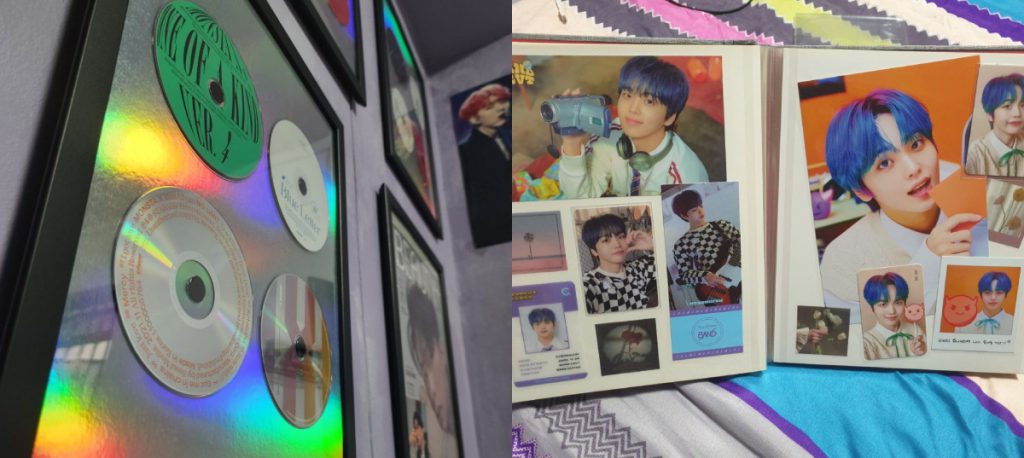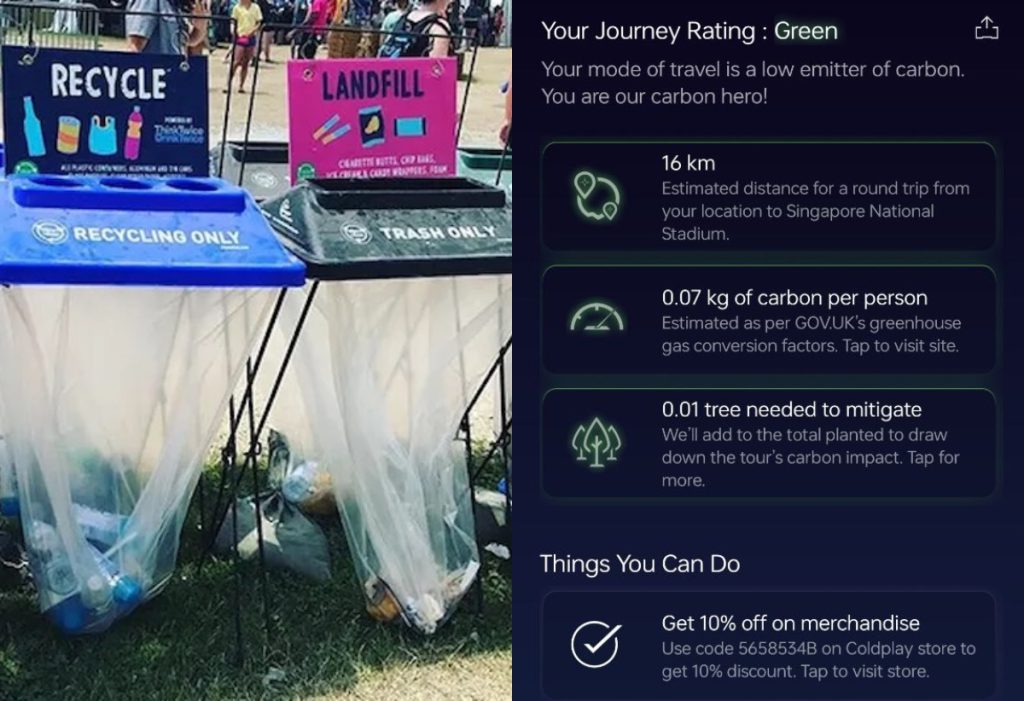If 2023 was the year of concerts, 2024 might be coming for that title, as many headliner tours will be held in Singapore over the next few months.
One of the most anticipated concerts that set Singapore on fire was British rock band Coldplay, who added the city-state as one of their stops for their Music Of The Sphere’s world tour.
They will perform a total of six shows at the National Stadium and made headlines for marketing their tour as “the most sustainable yet”. The idea of a “sustainable” or “green tour” seemed novel to me.
Thus, a few questions popped into my head: “How much waste is generated by the music industry?” “Who are taking active steps to limit their carbon footprint?” “Can the music industry become 100 per cent sustainable in the future?”
From concert tours to music festivals, let’s examine the music industry’s sustainability measures and whether it can contribute more to the environment in the future.
A breakdown of the carbon footprint of the global music industry
The Southeast Asian region saw more music events being held since the COVID-19 pandemic, with Singapore becoming an essential stop for many headliners, including Taylor Swift and Bruno Mars.
This has resulted in a boom in music tourism, where many fans have become more willing to spend more money on travelling from country to country to see their favourite artists perform.
However, the aftermath of these large-scale events could be described as a dystopia by some, as fields are filled with trash and destroyed tents. Moreover, most artists and fans travel by planes—which are commonly powered by kerosene and are the main culprit behind increasing greenhouse gas emissions worldwide.
This raises the question: How much waste is generated by the music industry annually? Let’s examine some data on the amount of waste generated from concerts and festivals.
Waste Generation
It’s going to take us a while to digest what we saw when we went to help salvage tents and equipment for a refugee charity at the end of Leeds Festival yesterday.
— Jack Lowe (@MrJackLowe) August 29, 2023
This is just a fraction of it — littering on the grandest scale we’ve ever witnessed.
Utterly appalling. pic.twitter.com/vNWOjIul74
As much as we may like to think that we can manage our trash, climate activists may say otherwise. According to statistics provided by the American collective Music For Sustainability, concertgoers in the United States produce 116,843,033 pounds of waste each year, which is approximately 53 million kilograms and equivalent to the weight of almost 390 blue whales!
Similar patterns can also be seen in Singapore, with the most recent occurrence during Coldplay’s concert on Tuesday (January 23). According to a news article by Today, volunteers from Stridy, an environmental non-profit organisation, conducted a one-hour cleanup after the event ended, collecting hundreds of cigarette butts and trash that weighed about 3kg.
These initiatives raise a pressing issue of urban littering in Singapore, which is caused by overconsumption and the lack of accountability from Singaporeans.
Instead of just (thinking) ‘Okay, I’m just going to play here and throw my things here, and ask someone else pick up after me’, what I really hope is that people do feel that they are part of the community and civil society, and that they should take ownership of where they play, love and should want to protect.
Vannessa Tan, Operations and marketing manager at Stridy, in an interview with Today.
The alarming figures result from many concertgoers’ behaviours and lifestyle habits—many event organisers also contribute to the waste epidemic.
Several concert venues prohibit fans from bringing food and water to their shows, limiting them to purchasing from food kiosks. The food items are often overpriced (a bottle of mineral water costs around S$3) and served with single-use plates and cutlery, which are often disposed of but not handled correctly for recycling.

Merchandise production is another waste contributor that is more apparent in the K-pop community. Unlike Western music artists, whose albums typically include CDs and a small booklet, K-pop albums come in multiple versions and include various merchandise, such as photo cards, that are coveted by fans worldwide.
The waste generated from bulk buying has been a pressing issue for environmentalist groups in the K-pop community. There are numerous instances where many albums have been discarded after fans have gotten their share of photo cards.
But what’s so special about these photo cards?

In the process of packaging physical albums for sale, different photocards are inserted at random. One can akin the buying experience to purchasing POPMART figurines, where buyers will never know which card they will get unless they open it.
This often spurs fans to purchase multiple albums in an attempt to increase their personal collection or be “lucky” enough to get one of their favourite members. Other reasons for bulk buying include:
- The one-in-a-lifetime chance of earning a fan call.
- The opportunity to participate in a fan meet with their idols.
- Improving a K-pop group’s music chart performances.
Cleaning up their act
With the numbers and revelations, achieving sustainability may seem impossible for the music industry. But the good news is that not all hope is lost, as more artists are stepping up their sustainability efforts.
When Coldplay first announced their Music Of The Spheres Tour, the band hoped to make the tour as “environmentally beneficial as possible”, aiming to cut their direct carbon emissions by half.
While many acts, including English singer Yungblud and British rock legends Radiohead, have been active in their efforts towards sustainability, Coldplay is the first to present a large-scale plan at the risk of intense scrutiny by critics—and the band has made substantial progress towards achieving their goal.
Here are the key figures from Coldplay’s June 2023 emissions update:

Meanwhile, the K-pop scene has also seen a movement towards better eco-friendly practices in terms of merchandise production. In the case of group VICTON, their fans (known as “ALICE”) were given the option to purchase a digital album instead of a physical one, and the photo card would be mailed to them.

Music labels in South Korea have also stepped up their sustainability efforts. JYP Entertainment, one of the country’s “Big 4” entertainment agencies alongside SM Entertainment, YG Entertainment and HYBE, was the first in the K-Pop scene to participate in the RE100 campaign – a global corporate renewable energy incentive.
In their 2021 ESG report, the company announced that its electricity consumption for 2022 would be fully powered by renewable energy.
The “higher power” of fandoms
They say there is power in numbers, which is why the music industry cannot move towards 100 per cent sustainability without the help of large fanbases.
For instance, Coldplay’s sustainability initiatives require their fans’ active involvement, from jumping on the kinetic dance floors to cycling for power. The band also worked with SAP to develop a mobile application for fans at their concerts, where they can play sustainability-themed games and track their carbon footprint.

The British rock powerhouse also created recyclable LED wristbands that are made from “100% compostable, plant-based materials.” While they are often kept as mementoes, many fans were shown depositing their wristbands to be recycled after their concert on Tuesday (January 23), contributing to the band’s sustainability efforts.
K-pop fans are also actively involved in promoting climate activism during large-scale events. KPOP4PLANET, a global climate activist platform created by K-pop fans in 2021, launched an initiative named FANDOM 4 TREES, where those from different fan groups can choose to plant or adopt other trees worldwide, resulting in approximately 28,000 tonnes of carbon dioxide being absorbed.
Another notable campaign spearheaded by K-pop fandoms is the “NO K-POP ON A DEAD PLANET” campaign, an ongoing initiative to urge K-pop entertainment companies to adopt more sustainable practices.

While fans’ enthusiasm might be labelled as “crazy” by many, it can also be a key driver to encourage more to contribute towards a greener planet.
Greenwashing is still apparent in the music industry
Although the global music industry has made significant strides in promoting sustainability, a significant issue that persists in the industry is greenwashing.
In layman’s terms, greenwashing occurs when a company preaches the idea of sustainability in its business but does not actually implement these plans.

For instance, Belgium’s EDM mega-festival Tomorrowland was accused of greenwashing in 2022 when it announced its partnership with Brussels Airlines for its “party flights”, contradicting its stance on sustainability when it promoted its “green initiatives” such as its “fun recycling club”.
For context, plane travel is the most significant contributor to the world’s greenhouse gas emissions (GHG), with 85,000 tonnes of GHG annually released by music festivals in the United Kingdom alone.
In response to the backlash, a spokesperson from Tomorrowland clarified that they “still have a long way to go” in hitting their sustainability goals and plans to enlist an external consultant to calculate their carbon footprint in 2023.
Following the incident, Tomorrowland announced that from 2024 onwards, it would collaborate with Brussels Airlines to use Sustainable Aviation Fuel (SAF) to power their “party flights” and offset kerosene use.
It is also worth noting that the infrastructure to measure a festival’s sustainability metrics accurately is still in development, making it challenging to hold event organisers and fans accountable.
To become truly sustainable, the industry needs collective efforts
The music industry has massive potential to promote and adopt sustainable practices into its operations through soft power. While it is heartening to see more artists and smaller festivals stepping up to the plate, mainstay industry players must make a bigger collective effort to make deeper imprints into the environment.
Firstly, event organisers and manufacturing companies can collaborate with sustainability experts or non-profit organisations to set clear goals and ensure transparency and accountability.

More eco-friendly modes of transport, such as EVs and sustainable fuel-powered planes, can also be considered for touring. According to an article by Energy5, not only will this reduce the carbon footprint, but it will also save on energy costs in the long run.
In an interview with The Korean Herald, Yun Sun-jin, a professor at the Graduate School of Environmental Studies at Seoul National University, suggested that stage designers can use reusable materials to decorate physical stages as they are often installed temporarily. He added that music fans can start a chain reaction to push the green movement further.
(Fans, artists and K-pop agencies) can cooperate to create forests not only in urban areas in the country, but also in developing countries that really need such nature. … Making donations to support residents and environments impacted by flooding and landslides caused by abnormal weather is another way, while building solar power generation facilities with a portion of album sales proceeds is another option.
Yun Sun-jin, Professor at Seoul National University in an interview with The Korean Herald
Nobody said it was easy, but if we can become more intentional about our planet’s sustainability, perhaps we can “fix” it for future generations.
Featured Image Credit: Lifestyle Asia










